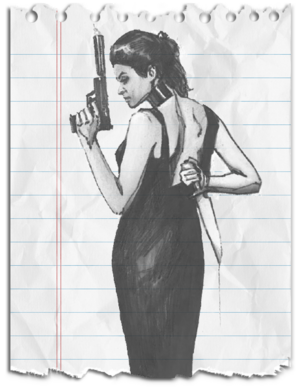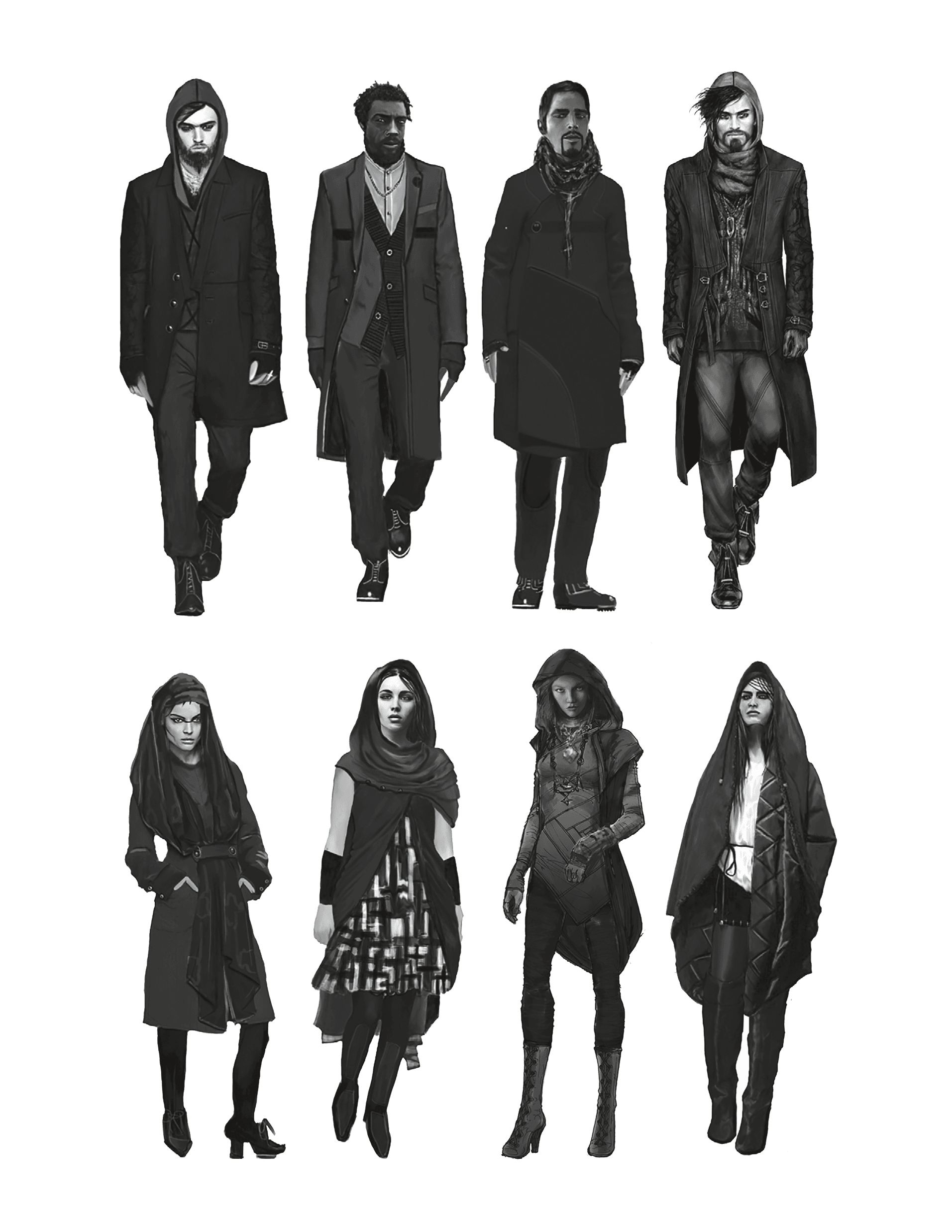Banu Haqim
WHO ARE THE BANU HAQIM?
Clan of the Hunt | Assamites | Children of Haqim | Lawgivers
The Judges of the Banu Haqim are torn between their hereditary thirst and their passion for justice. The Judges have long set themselves apart from Kindred society to better deliver their soul stealing capital punishments. That is about to change. A schism divides the clan between followers of the newly awoken methuselah, Ur-Shulgi, and the Islamic Warriors and Vizirs embraced long after the clan abandoned their merciless blood worship. Alamut — the Children's hidden base of operations somewhere in Afghanistan — has fallen entirely to the blood cultists, who prepare to deliver their judgment on their kin, and most sensible Haqimites are now exiles fleeing their old home. The majority of these have joined the faithful sect of Muslim Kindred: the Ashirra, or are seeking asylum and full membership in the sect’s western counterpart — the Camarilla.
Whether they are cultists or warriors for justice, all Children of Haqim adhere to a strict code of some kind, be it Ur-Shulgi’s blood laws, a personal vendetta, the American constitution, some obscure variant of Islamic law or even postmodern theories of oppression. But no vampire is free of self-interest. The uncomfortable truth is that the Children hide their uncontrollable lust for diablerie behind a strict idea of right and wrong. To the Judges someone is always guilty. And the guilty must be punished, their souls sucked out through their arteries to make the Judge stronger in preparation for the next justified murder.
The Banu Haqim include a diverse array of hunters, judges, and killers. Though the clan’s focus on judgment frequently manifests in the act of dealing death, the mortals Embraced into the clan are as often qadis, strategists, and law students as they are bounty hunters, soldiers, police officers and trained assassins. The clan’s geographical ties likewise make most of the members embraced between 600 C.E. and the early 20th century of one of the denominations of Islamic belief. Older Banu Haqim tend to worship the Blood over any mortal faith. Young members of the clan hail from any place or culture in the world, and while some convert to Islam after their death, most modern Haqimites keep the faith of their breathing days and are respected for it.
In modern nights, Banu Haqim target mortals capable of assessing and handling threats, enforcing law and tradition through force of personality or skill, and of course, killers who would contribute to the clan’s aims. The Banu Haqim keep a look out for war veterans, especially those disgraced or wounded in war. They offer them immortality, a chance at redemption, and purpose. Such mortals become prized neonates.
The Banu Haqim are more than a clan of murderers descended from al-Ḥashāshīn, though they have adopted many practices from that mortal sect. The Viziers and Warriors of the clan descend from different broods of Haqim. Each feels compelled to Embrace different mortals, with the Warriors tending toward the martially inclined, while the Viziers drain and turn those with political and legal power. The connection between the two is law. Banu Haqim within the Ashirra and Camarilla strive to maintain and enforce law, making their choice of prospective fledglings
critical.
DISCIPLINES
Blood Sorcery: The power to poison vitae and use the Blood as a weapon against others, as well as sifting truth through the manipulation of Blood. The Banu Haqim keep the secrets of their Blood Sorcery close. The warriors of the clan typically pursue a form of blood magic known as Quietus that provides its practitioners murderous abilities, while viziers delve into versatile ritual aspects, gleaning secrets from their Blood and others’.
Celerity: The ability to move and react quicker than humanly possible. The Children of Haqim use Celerity to terrifying effect. Many are skilled in its use before all other Disciplines, to rely on speed of judgment before doubt can slow a blade to the throat. Hesitation leads to a vampire’s demise. When feeding, the Banu Haqim dance a dervish of drinking from their favored vessels, darting in and drinking their fill before disappearing as quickly as they appeared.
Obfuscate: The ability to melt into shadows, craft an illusory appearance, or fade from plain sight. The Banu Haqim stalk their prey clad in shadow, whether as a means to feed discreetly or deliver final death to a target without ceremony of formal challenge. Some Banu Haqim utilize this Discipline to witness a target committing a crime, before delivering judgment.
BANE
Banu Haqim are drawn to feed from those deserving punishment. This is especially true for vampire Blood, the very essence of transgression. When one of the Judges tastes the Blood of another Cainite, they find it very hard to stop. Slaking at least one Hunger level with vampiric vitae provokes a Hunger Frenzy test (See Core Rules p. 220) at a Difficulty 2 + Bane Severity. If the test is failed they attempt to gorge themselves on vampire Blood, sometimes until they diablerize their Kindred victim. This presents many problems as the Banu Haqim integrate with the Camarilla, who tend to see the Amaranth as anathema.
Noxious Blood: Death lurks in the Blood of the so-called Assassins. While its effect on other vampires is the same as any vitae, it is poison to mortals and risks the life of anyone the Banu Haqim would try to make their ghoul or Blood Bond.
A mortal drinking the Blood of a Banu Haqim vampire suffers Aggravated Damage equal to the Bane Severity of the vampire for each Rouse Check’s worth of Blood ingested. In addition, Banu Haqim vitae cannot be used to heal mortal injuries (see p. 139). Banu Haqim vitae does not have any other toxic properties; in amounts below the quantity needed to create a Blood Bond, it inflicts no damage even if injected directly into the bloodstream, for example.
Players Guide, pg. 56
COMPULSION
Judgement
The vampire is compelled to punish anyone seen to transgress against their personal creed, taking their blood as just vengeance for the crime.
For one scene, the vampire must slake at least one Hunger from anyone, friend or foe, that acts against a Conviction of theirs. Failing to do so results in a three dice penalty to all rolls until the Compulsion is satisfied or the scene ends. (If the one fed from is also a vampire, don’t forget to test for Bane induced Hunger frenzy.)
ARCHETYPES
Law Student
The Banu Haqim value understanding of law and tradition, frequently Embracing legal experts to help modernize (or at least make relateable) the clan’s expectations of all Kindred. This Child of Haqim was still studying law when turned into a vampire, and suddenly the boundaries changed. No longer restricted to 21st century versions of mortal law, they are now an expert in Kindred law. Such a Child of Haqim commands respect among the Viziers.
Union Chief
Knowing when to put feet to the streets, when to arm and take down the man, and when to hold back and simply refuse to aid a tyrant sets this Child of Haqim apart from the stereotypical law abiding members of their clan. The Union Chief came from a background where knowing legal loopholes and how to encourage others into action was integral to their success.
The Arbiter
This Child of Haqim may have been a Sheriff in life or in undeath. In some way, they were an enforcer of judgment, perhaps holding a position of moral power such as priest, imam, or community leader in a small town or commune. Their ability to wield laws led to the eventual Embrace.
Hired Gun
In their mortal days, this Child of Haqim was a killer, plain and simple. Perhaps with a military, law enforcement, or security background, but just as likely to be an individual with murderous urges. At least one lethal act drew the attention of a Banu Haqim sire. Now this character continues to live by the gun, or the knife, the poison, or the severe beating, but with all the legitimacy of a hired mercenary.
Blood Scholar
The Banu Haqim are known for their obscure blood magic and reverence of the vitae, but this vampire was a blood scholar before the Embrace. Whether a member of a Sufi study group, a cultist in a fringe religion, or a ghoul in the service to a thaumaturge, this mortal’s activities drew the Banu Haqim’s attentions, and they were put to work interpreting the will of the Blood, along with ways to subvert it.
MUSIC FROM THE SUCCUBUS CLUB



